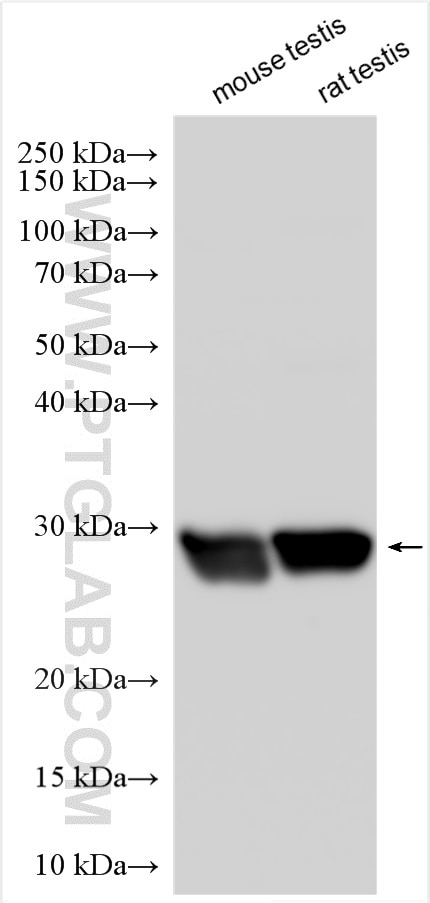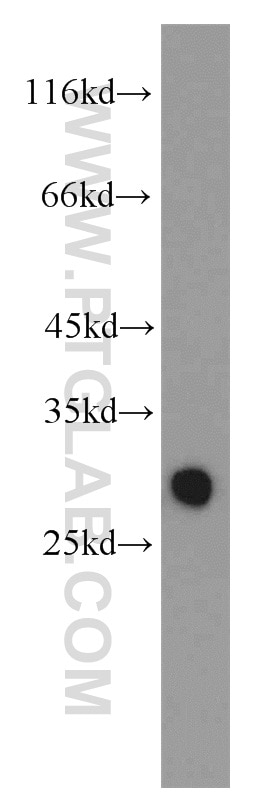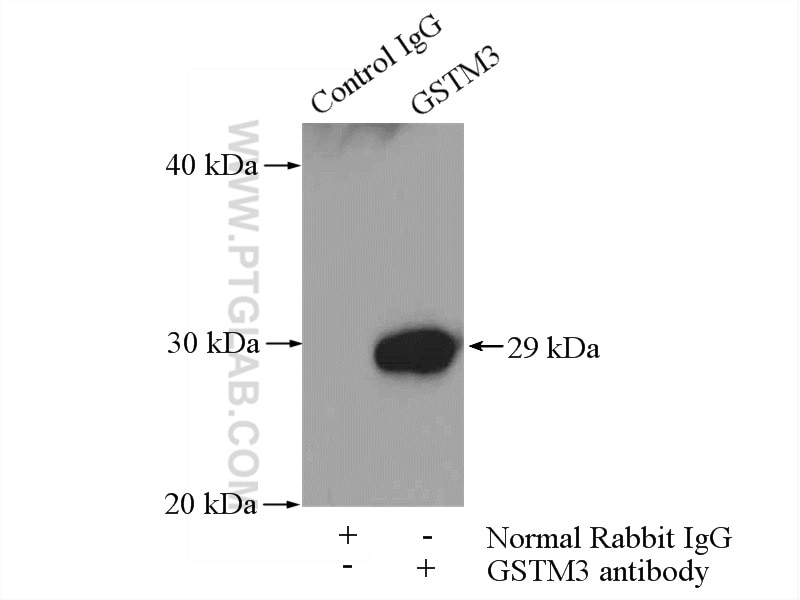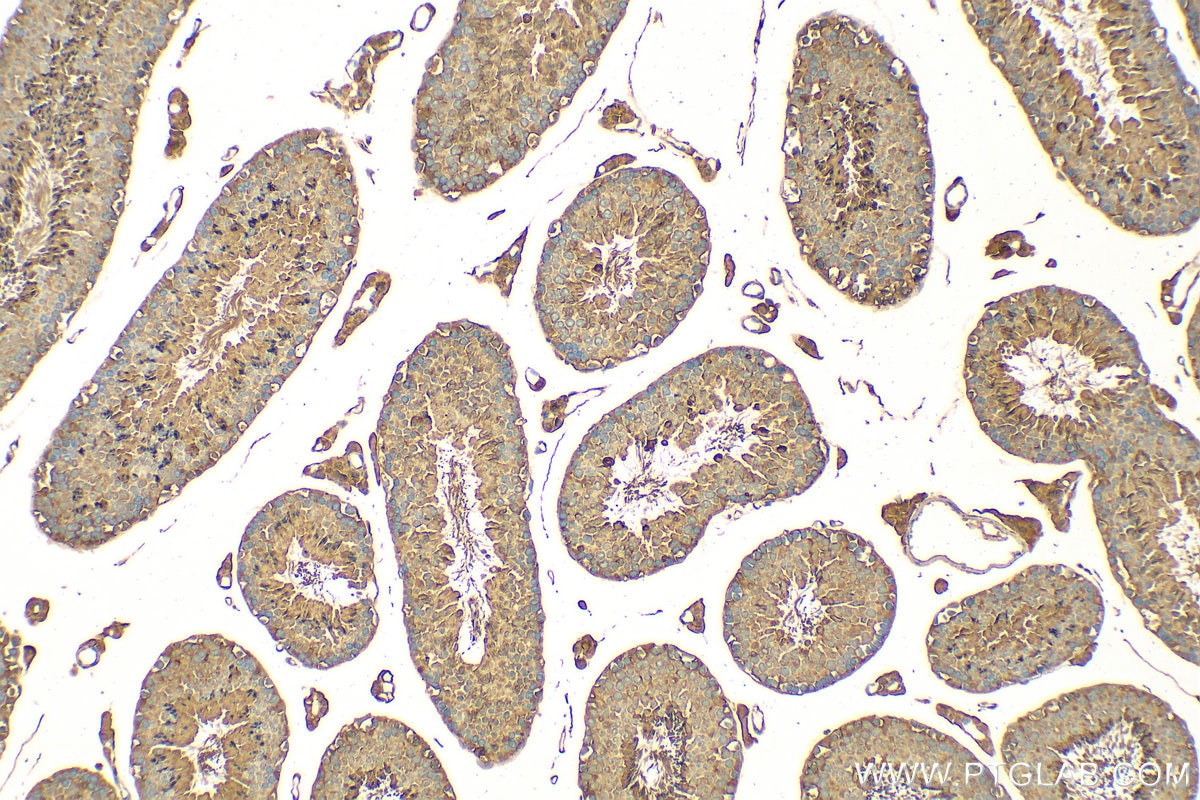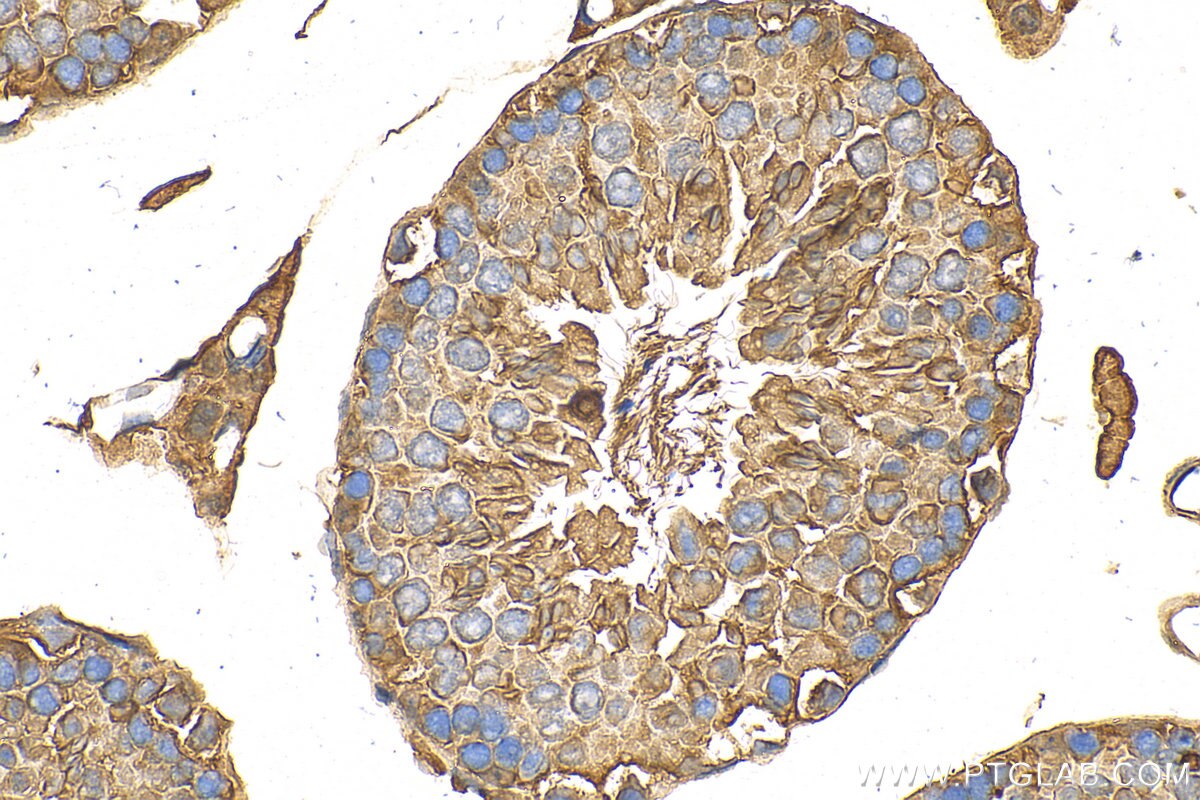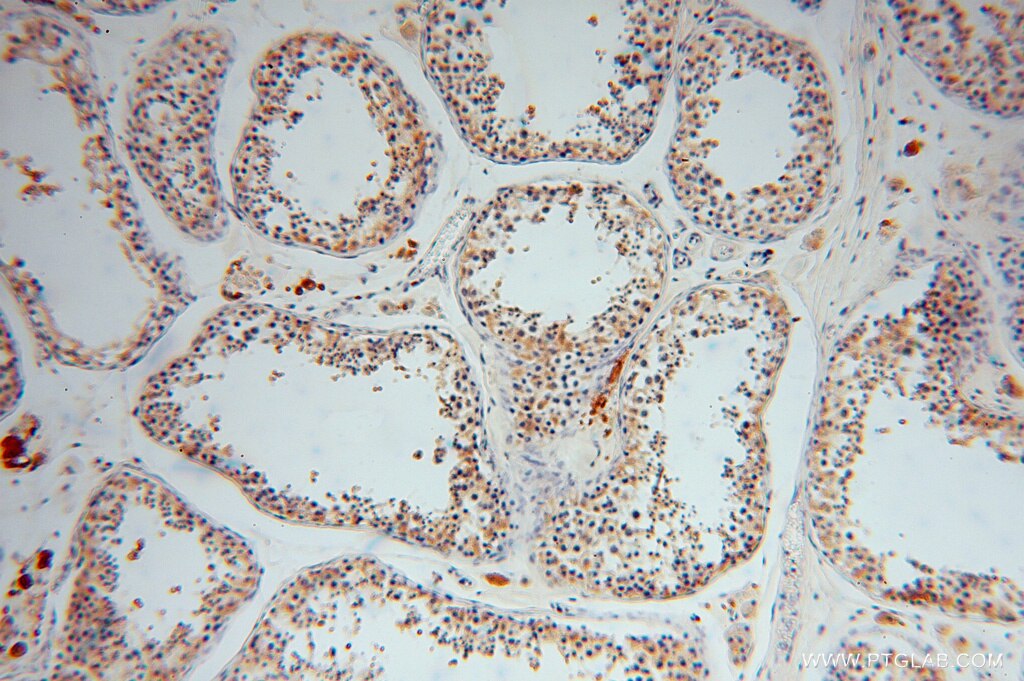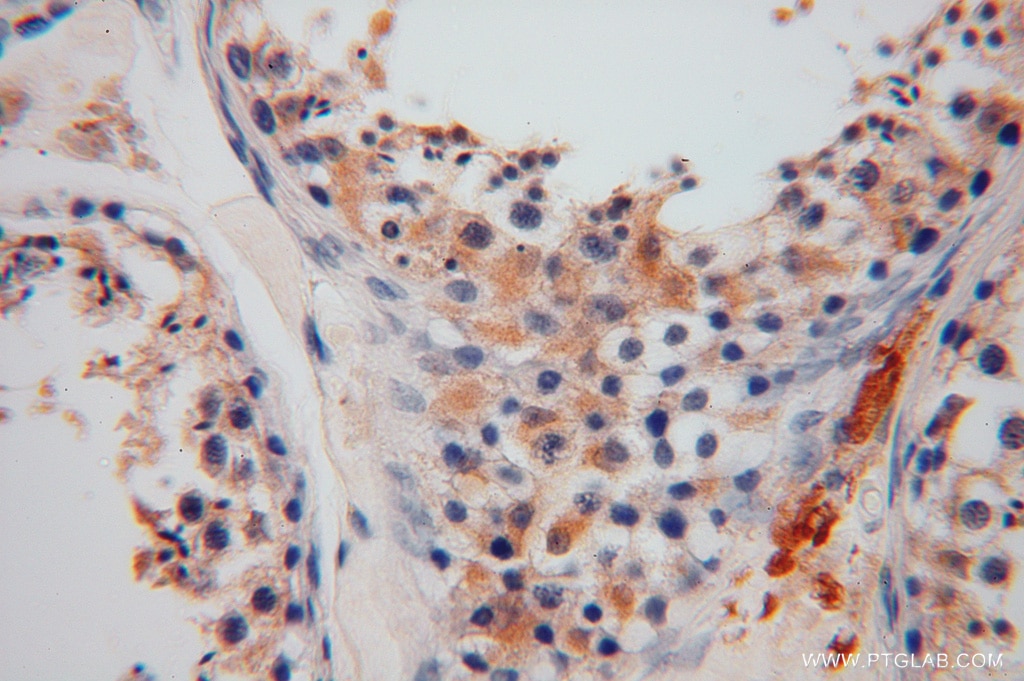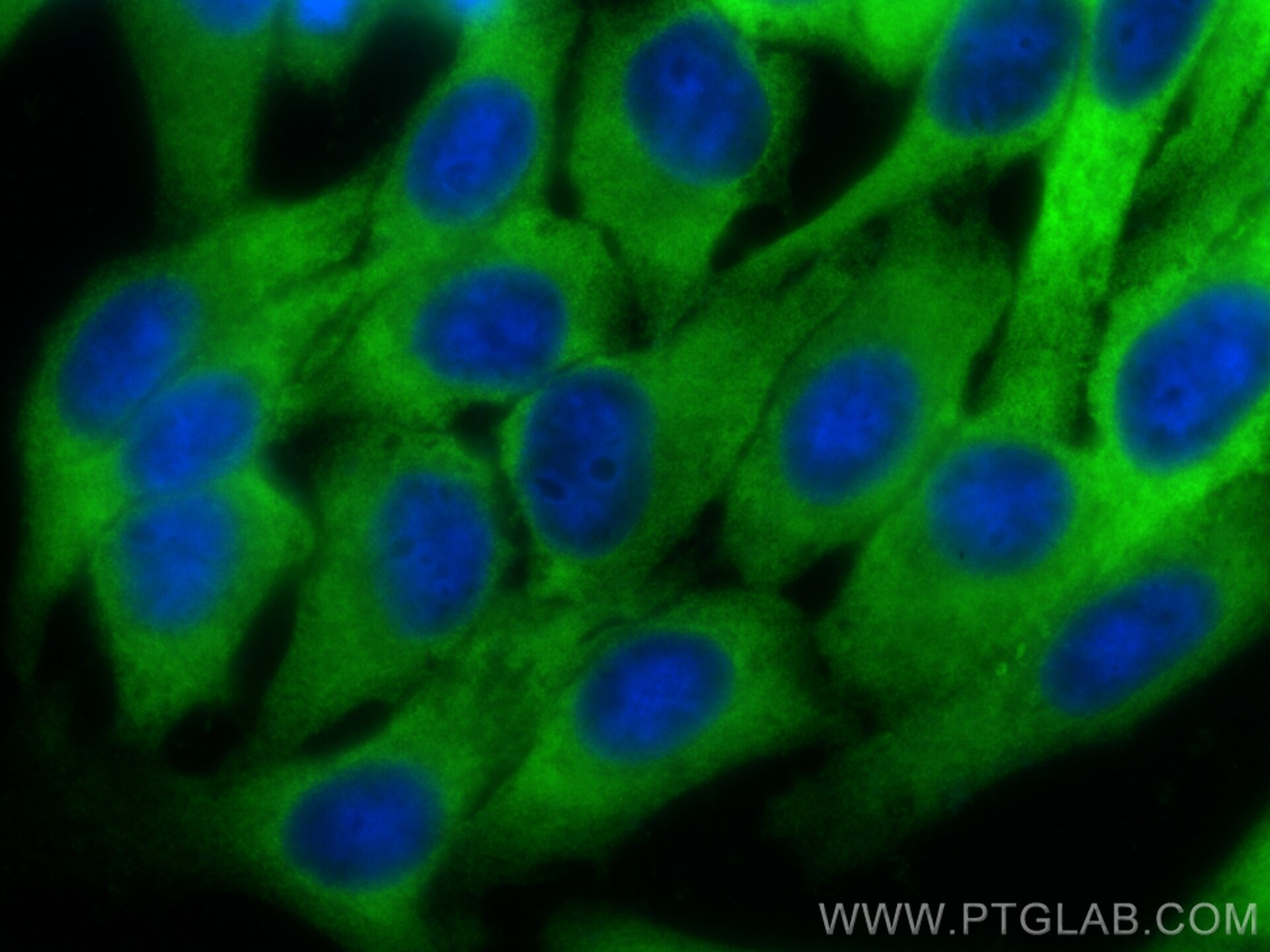Tested Applications
| Positive WB detected in | mouse testis tissue, human testis tissue, rat testis tissue |
| Positive IP detected in | mouse testis tissue |
| Positive IHC detected in | mouse testis tissue, human testis tissue Note: suggested antigen retrieval with TE buffer pH 9.0; (*) Alternatively, antigen retrieval may be performed with citrate buffer pH 6.0 |
| Positive IF/ICC detected in | HepG2 cells |
Recommended dilution
| Application | Dilution |
|---|---|
| Western Blot (WB) | WB : 1:2000-1:12000 |
| Immunoprecipitation (IP) | IP : 0.5-4.0 ug for 1.0-3.0 mg of total protein lysate |
| Immunohistochemistry (IHC) | IHC : 1:50-1:500 |
| Immunofluorescence (IF)/ICC | IF/ICC : 1:200-1:800 |
| It is recommended that this reagent should be titrated in each testing system to obtain optimal results. | |
| Sample-dependent, Check data in validation data gallery. | |
Published Applications
| KD/KO | See 4 publications below |
| WB | See 17 publications below |
| IHC | See 7 publications below |
Product Information
15214-1-AP targets GSTM3 in WB, IHC, IF/ICC, IP, ELISA applications and shows reactivity with human, mouse, rat samples.
| Tested Reactivity | human, mouse, rat |
| Cited Reactivity | human, mouse, rat, bovine, sheep |
| Host / Isotype | Rabbit / IgG |
| Class | Polyclonal |
| Type | Antibody |
| Immunogen |
CatNo: Ag7375 Product name: Recombinant human GSTM3 protein Source: e coli.-derived, PGEX-4T Tag: GST Domain: 1-225 aa of BC000088 Sequence: MSCESSMVLGYWDIRGLAHAIRLLLEFTDTSYEEKRYTCGEAPDYDRSQWLDVKFKLDLDFPNLPYLLDGKNKITQSNAILRYIARKHNMCGETEEEKIRVDIIENQVMDFRTQLIRLCYSSDHEKLKPQYLEELPGQLKQFSMFLGKFSWFAGEKLTFVDFLTYDILDQNRIFDPKCLDEFPNLKAFMCRFEALEKIAAYLQSDQFCKMPINNKMAQWGNKPVC Predict reactive species |
| Full Name | glutathione S-transferase mu 3 (brain) |
| Calculated Molecular Weight | 27 kDa |
| Observed Molecular Weight | 27-29 kDa |
| GenBank Accession Number | BC000088 |
| Gene Symbol | GSTM3 |
| Gene ID (NCBI) | 2947 |
| RRID | AB_2116070 |
| Conjugate | Unconjugated |
| Form | Liquid |
| Purification Method | Antigen affinity purification |
| UNIPROT ID | P21266 |
| Storage Buffer | PBS with 0.02% sodium azide and 50% glycerol, pH 7.3. |
| Storage Conditions | Store at -20°C. Stable for one year after shipment. Aliquoting is unnecessary for -20oC storage. 20ul sizes contain 0.1% BSA. |
Background Information
GSTM3 is a cytosolic enzyme involved in prostaglandin and leukotriene synthesis and in the metabolization of toxic compounds, such as chemotherapeutic drugs, insecticides, herbicides, carcinogens, and by-products of oxidative stress. GSTM3 is expressed in testis, brain, lung, and lymphocytes. GSTM3 have been reported to be dysregulated in cancers like prostate cancer and colon cancer.
Protocols
| Product Specific Protocols | |
|---|---|
| IF protocol for GSTM3 antibody 15214-1-AP | Download protocol |
| IHC protocol for GSTM3 antibody 15214-1-AP | Download protocol |
| IP protocol for GSTM3 antibody 15214-1-AP | Download protocol |
| WB protocol for GSTM3 antibody 15214-1-AP | Download protocol |
| Standard Protocols | |
|---|---|
| Click here to view our Standard Protocols |
Publications
| Species | Application | Title |
|---|---|---|
Cell Metab TMEM41B acts as an ER scramblase required for lipoprotein biogenesis and lipid homeostasis. | ||
Mol Cell SMURF2 predisposes cancer cell toward ferroptosis in GPX4-independent manners by promoting GSTP1 degradation | ||
Cell Syst Rare Disease Mechanisms Identified by Genealogical Proteomics of Copper Homeostasis Mutant Pedigrees. | ||
Cancer Lett GSTM3 deficiency impedes DNA mismatch repair to promote gastric tumorigenesis via CAND1/NRF2-KEAP1 signaling.
| ||
Part Fibre Toxicol Protein target identification and toxicological mechanism investigation of silver nanoparticles-induced hepatotoxicity by integrating proteomic and metallomic strategies. |

